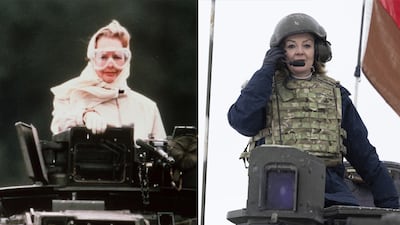The scene is a historic English coastal town. The town is “historic” because the Romans first landed in England near here. Henry VIII built a string of castles nearby to keep out other foreign invaders. A different kind of history – and a different invasion – is happening in the town square.
Vintage American cars, Oldsmobiles and Chevrolets from the 1950s, are on display, beautifully restored. There’s music too, of the same vintage. On an outdoor stage, two women and two men play what I think is skiffle music, though I admit to being vague on 1950s pop culture. Next to me, a group of friends meet and exchange greetings and hugs. They are all older, in their 70s. The men are dressed in draped jackets, tight trousers and shirts with narrow ties or American-style bootlaces, the uniform of what in 1950s-England were called “Teddy Boys". The men (those who retain some hair) have Elvis Presley-style haircuts. Some have mutton-chop beards that don’t quite meet on their chin. The women have the kind of dresses that I have only seen in 1950s movies.
But what is remarkable is the number of younger people who have gathered for this 1950s nostalgia-fest. They have adopted the styles of that era even though they were not born until the 1980s or 90s. The nostalgia is affectionate and charming but it replicates an America that is not only long gone, but which – even in the 1950s – didn’t exist in this settled, idealised way.
To the elderly partygoers, the 1950s may have been the time of their lives, but America then was racially segregated. American schoolchildren were taught in class to “duck and cover” under their desks in case of nuclear war. The war in Korea was a mess, ending in stalemate. It led to another Asian war, in Vietnam. The Cold War and the Cuban missile crisis a few years later threatened nuclear annihilation.
Yet, nostalgia is generally built on a past that may look settled compared to today’s uncertainties, but historians remind us that the past was always as unsettled – or worse – than now. Cultural references, once apparently innocent, change too. In the English coastal town, in the clothes and record stalls there were some Confederate flags, nostalgia (presumably unintended) for what was in reality a racist rebel state where slavery was permitted and celebrated.
All this bleeds into political nostalgia too. When in 2020 a Korean-language film, Parasite, won the Oscar for Best Picture, then US president Donald Trump said Hollywood should make more movies like Gone With The Wind. It’s a celebration of the Confederacy in which golden sunsets bless black slaves happily toiling for their white owners – historical nonsense, but useful Trump political nostalgia.
British political nostalgia also may avoid inconvenient facts. English politicians often reference the Second World War, when Britain “stood alone” against the Nazis, and the country was united by the “Blitz Spirit”. Historians point out that it was the entire British Empire – including Canada, Australia, and many other nations, including the Free French – that (for part of the war) “stood alone” against Adolf Hitler. There were also serious social divisions during the Blitz when working-class children from London were evacuated to wealthy rural districts – and not always welcomed.

After the 1950s festival, I stumbled into another nostalgia-fest. A famous Brit-pop musician was DJ-ing at a club, the kind of event I would always avoid. But some good friends had spare tickets and I decided it would be churlish to say no. The DJ played hits (including his own) from the 1990s. Drowning in nostalgia, I made my excuses and left, wondering how far other nations suffer the nostalgia bug too.
All of them, probably.
In America, for some, the Confederacy still remains the “lost cause", in need of resuscitation. In Russia, as we are all too aware, there remains profound nostalgia for the Russian or Soviet Empire. In China, modern politics includes ambitions for the future to replicate past imperial greatness. And in France, some restaurants offer “cuisine grand-mere” – grandmother’s food, comforting and a bit stodgy, nostalgia that fills you with warmth.
Meanwhile in Britain, we have political nostalgia of the most bizarre kind. The (now likely) candidate to become the UK’s next prime minister is Liz Truss. She has for months laid the groundwork for her leadership campaign by nostalgically referencing Margaret Thatcher, our first female prime minister. Thatcher was very divisive in the 1980s but remains a great Conservative hero. Ms Truss has dressed herself in similar clothes to Thatcher. She has staged Thatcheresque photo-opportunities including one in a tank, while some military strategists think tanks are obsolete.
Personally, I have no direct experience of 1950s-America and I never really liked Brit-pop in the 1990s. But I did meet and interview Thatcher. I can confirm that, no matter how many tanks or Thatcheresque poses Ms Truss adopts, she is no Thatcher.
As the old joke says, “nostalgia isn’t what it used to be". It never was.


